Charcoal vs gas grills – which is best?
There's a lot to consider when it comes to charcoal vs gas
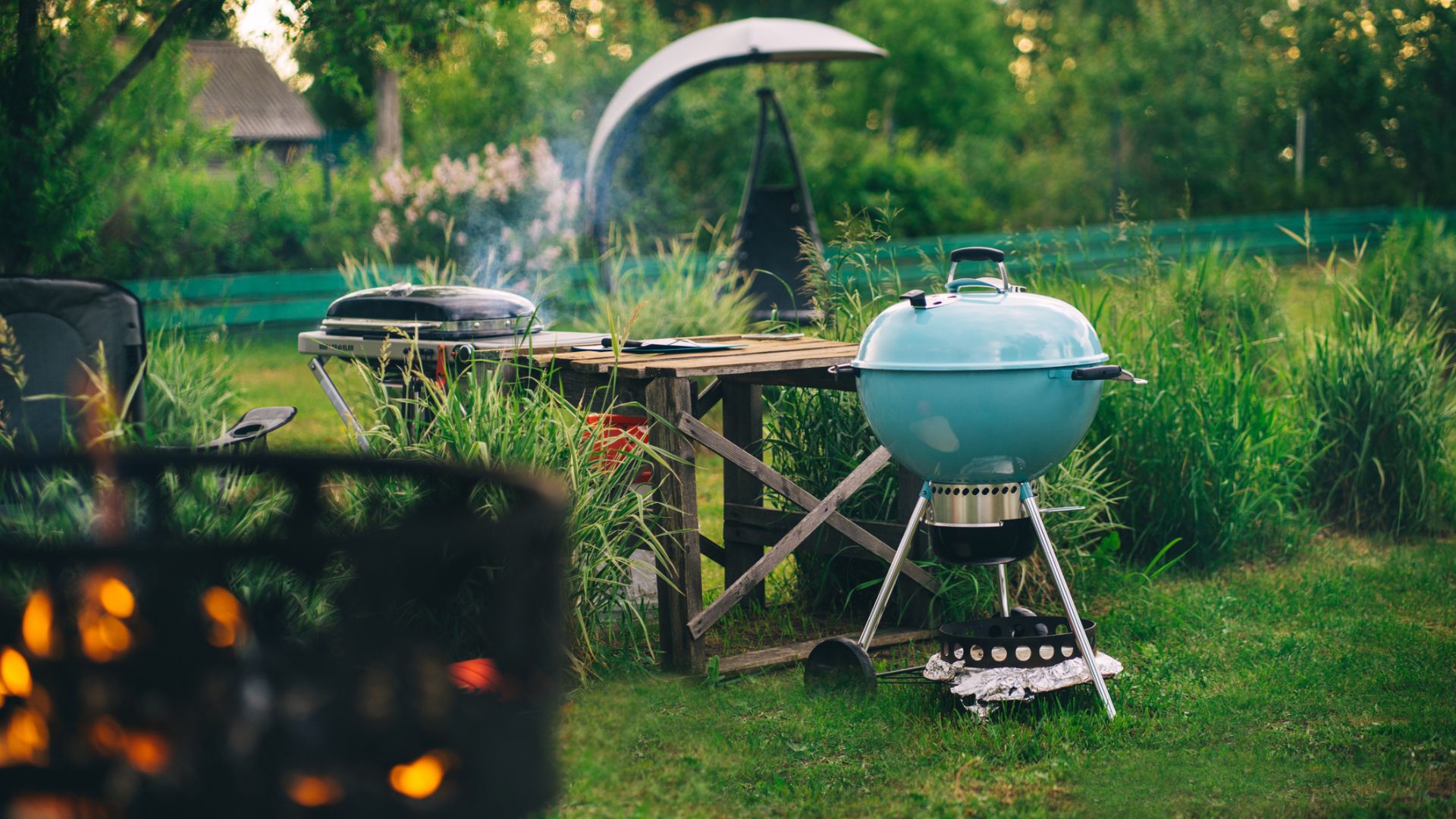

Spring is finally here, so it's time to upgrade your grilling game in time for spring and summer parties. But before you do anything, there's an age-old debate to try and settle.
There are two main types of grill: gas and charcoal. To the uninitiated, it seems like a tiny difference. Who cares how their food is heated up, right?
However, there are several differences between the two grills. Charcoal grills are cheaper and taste better, but gas grills are much more straightforward and feed a crowd. Even the best grills have their drawbacks depending on the type of fuel they use.
I've tested grills for years, so I know exactly what makes them tick, and the pros and cons of both types of appliance. I also spoke to backyard and cooking experts for their take on which grill you should buy.
Head to head
Before we get started, here's a quick head-to-head of my favorite grills, so you can see the differences between the two types.
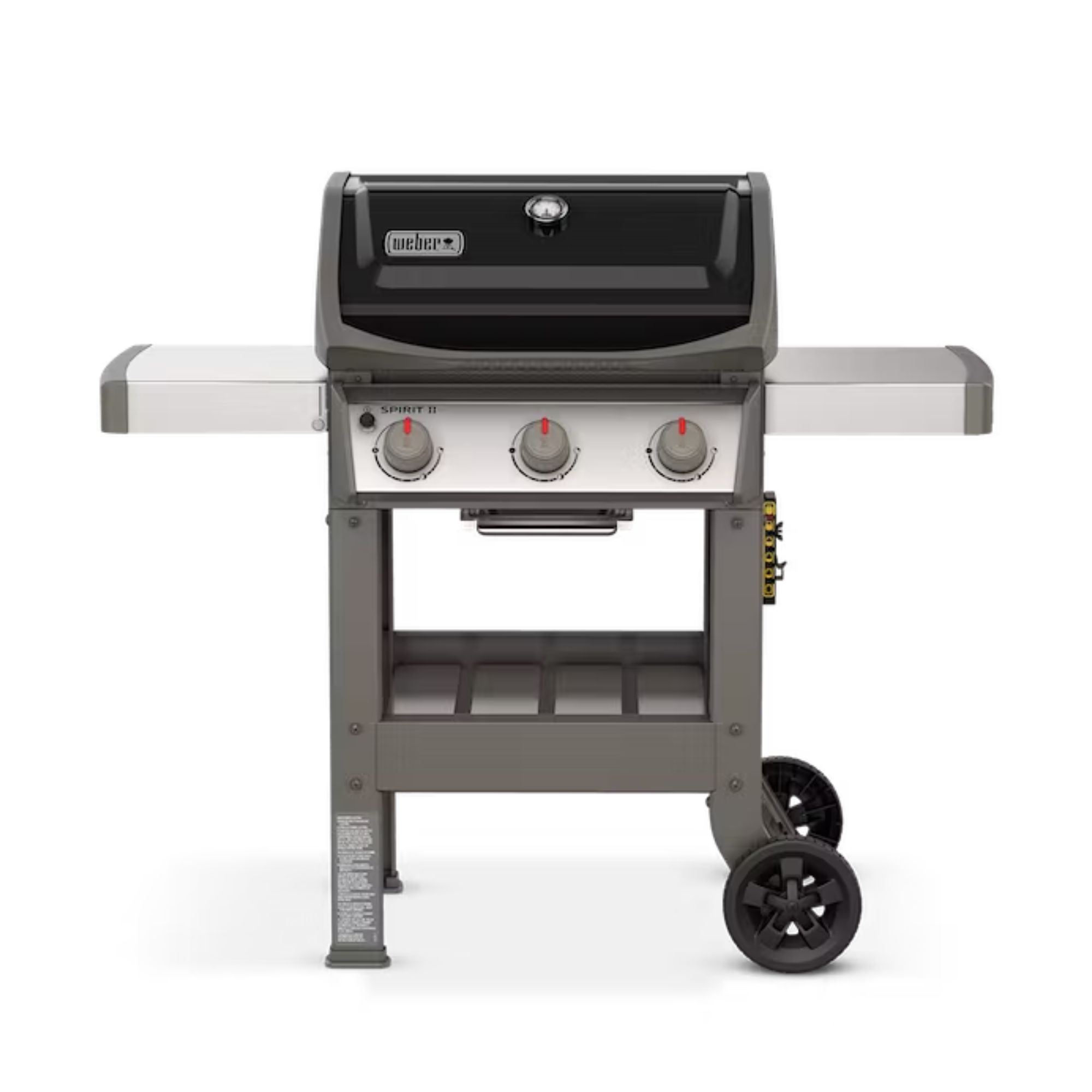
Cook surface: 660 sq-in
Dimensions: 29" x 59" x 47"
Fuel: Gas
This is still the best gas grill I've ever used, and it suits almost everyone. It's a fair price, straightforward, and made the best food of any grill we tested. It's more expensive than the Napoleon Pro 22K but has a bigger cooking area, and it's easier to use.
For
- Easy to set up
- Easy to use
- Best burgers on test
- Best chicken on test
- Reasonable price
Against
- Small side rack for propane
- Wide grills for thin-sliced foods
- Plastic control knobs
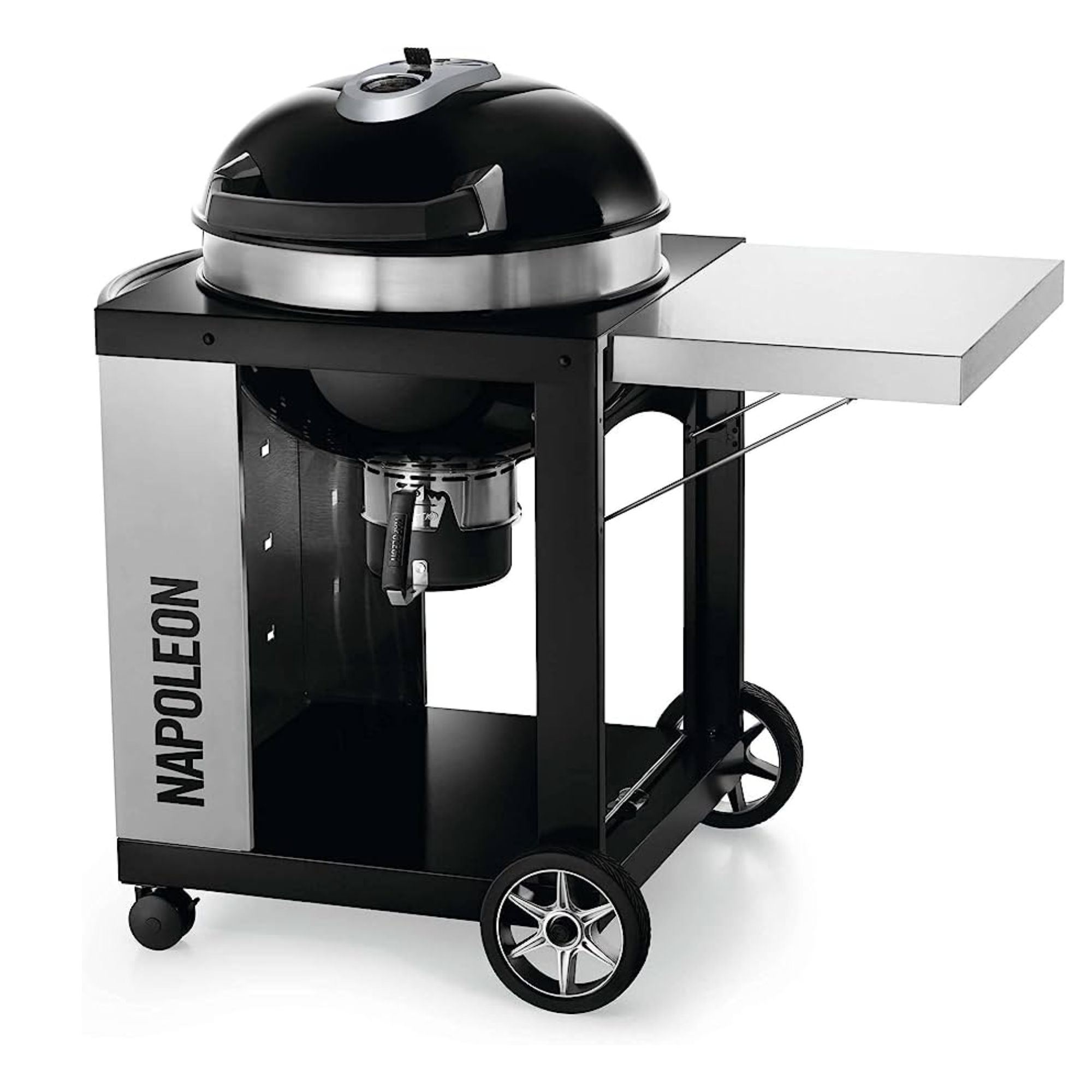
Cook surface: 365 sq-in
Dimensions: 27.5" x 38.5" x 22.5"
Fuel: Charcoal
I like this charcoal grill because it has all the functionality of a gas grill with the smoky flavor of a charcoal grill. We found that it made incredible chicken and steaks. It's a couple hundred dollars cheaper than the Weber Spirit II E-310, but has a smaller cooking area.
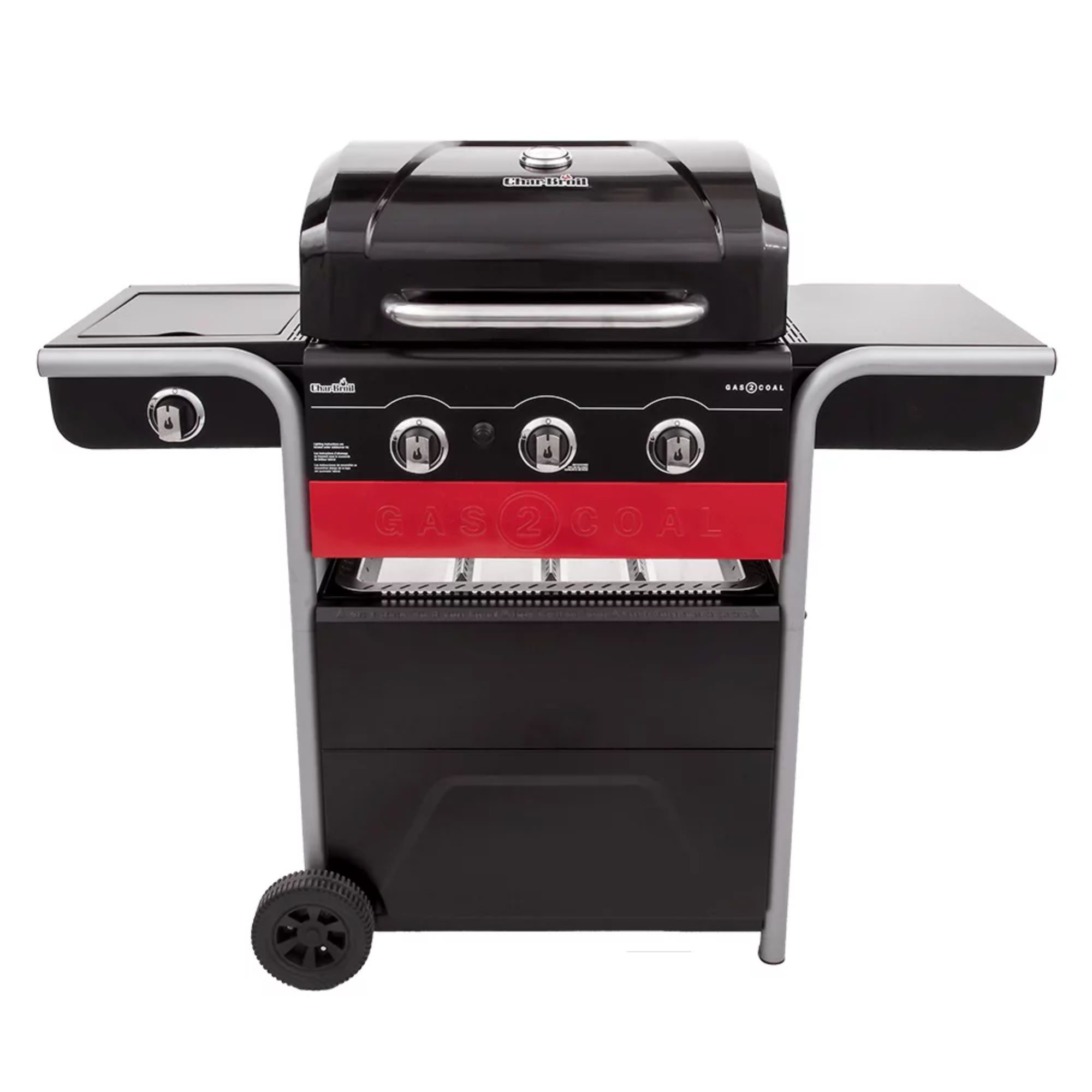
Cooking area: 420 sq-in
Dimensions: 47" x 52" x 24"
Fuel: Charcoal and gas
I recommend this hybrid if you can't pick between the two types. It can switch between both types of fuel and does a great job with both. However, we weren't very impressed with its side burner.
Gas grills: Pros
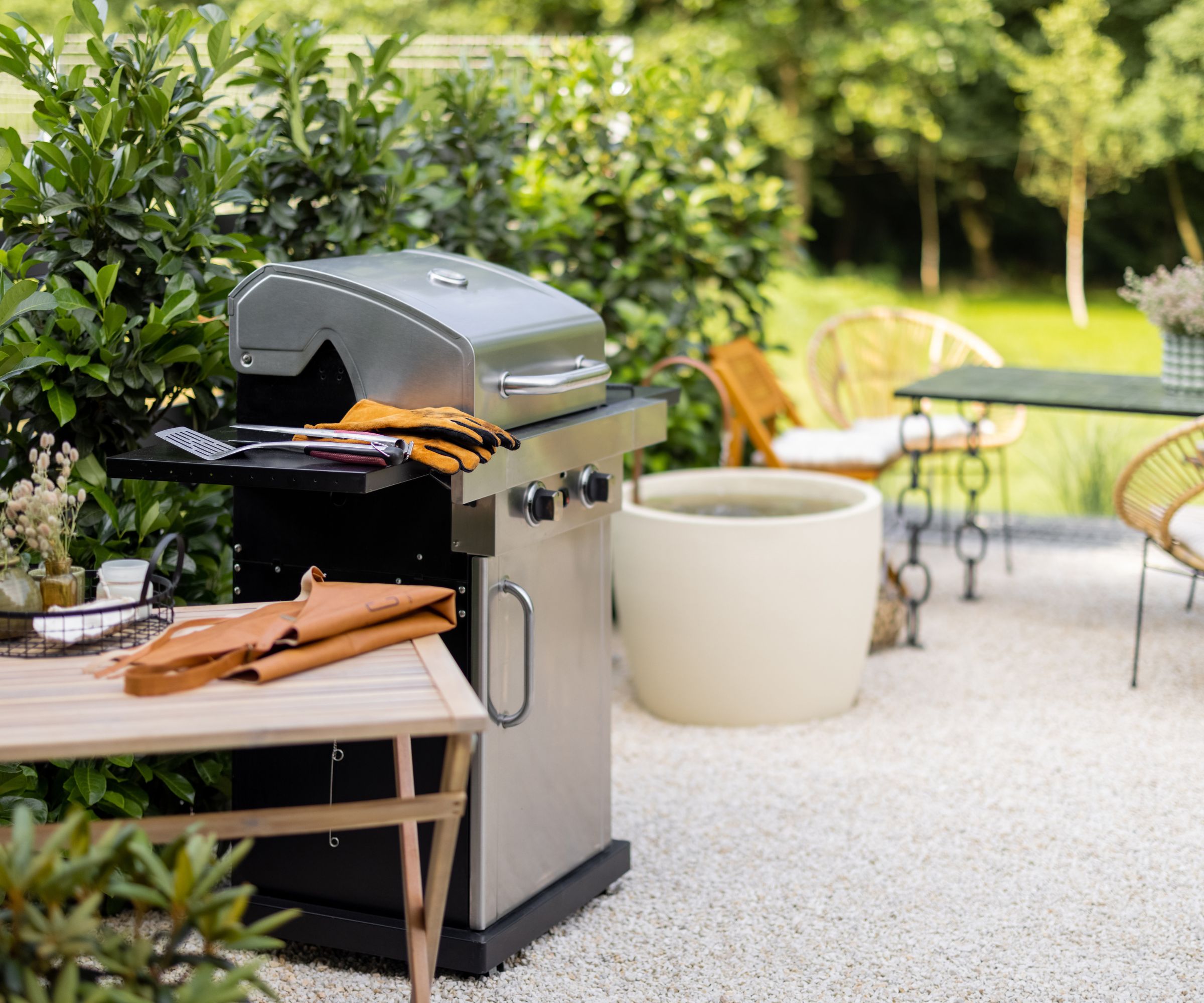
Convenience is the best thing about gas grills. Grilling on charcoal always feels like an event, with elaborate lighting techniques and the long wait for the charcoal to reach temperature. A gas grill, on the other hand, is as simple as turning on a range. If your family has a sudden craving for burgers on a random Thursday night, you can have them grilled and ready in under half an hour.
Gas grills also offer a lot more control than charcoal grills. While you can set up charcoal for direct and indirect heat, getting it wrong can mean burnt chicken and undercooked burgers. On a gas grill, you can simply turn up the heat and turn it down as you need, making for more precise cooking
Gas grills are also packed with features that you don't get on a charcoal grill. My favorite is a side burner, which is helpful for grilling sides like peppers and onions. They almost always have warming racks for keeping sides warm, and most have handy side tables for plating dishes and keeping marinades and sauces on hand. More expensive models will also come with digital thermometers, rotisserie functions, and even built-in lighting.
Even garden aesthetics can be improved with a gas grill. As big, steel appliances, grills of any kind can look incongruous on a perfectly maintained patio. Gardens expert Drew Swainston told me that 'gas grills are usually sleeker and tidier than their charcoal counterparts. Best of all, they're easier to incorporate into an outdoor kitchen, which is much better for your overall garden style. It stops it from looking like a random appliance parked on your deck or patio'. My favorite example of this is the Everdure Force, which I tested last year. It comes in a beautiful mid-century orange; a welcome change from the usual boring blacks and greys.
More importantly, gas grills are crucial if you often feed a crowd. Charcoal grills tend to be limited to cooking for 12 people at once if you stagger your cooking. Instead, the biggest gas grill we've tested, the Weber Genesis SPX-435, available at Weber, has more than a thousand inches of cooking space and can make 40 burgers at once. That's overkill for most families, but if you're regularly hosting large gatherings, it's good to have the option.

Drew’s passion for gardening started with growing vegetables and salad in raised beds in a small urban terrace garden. He has gone on to work as a professional gardener in historic gardens and also specialise as a kitchen gardener growing vegetables, fruit, herbs, and cut flowers.
Gas grills: Cons
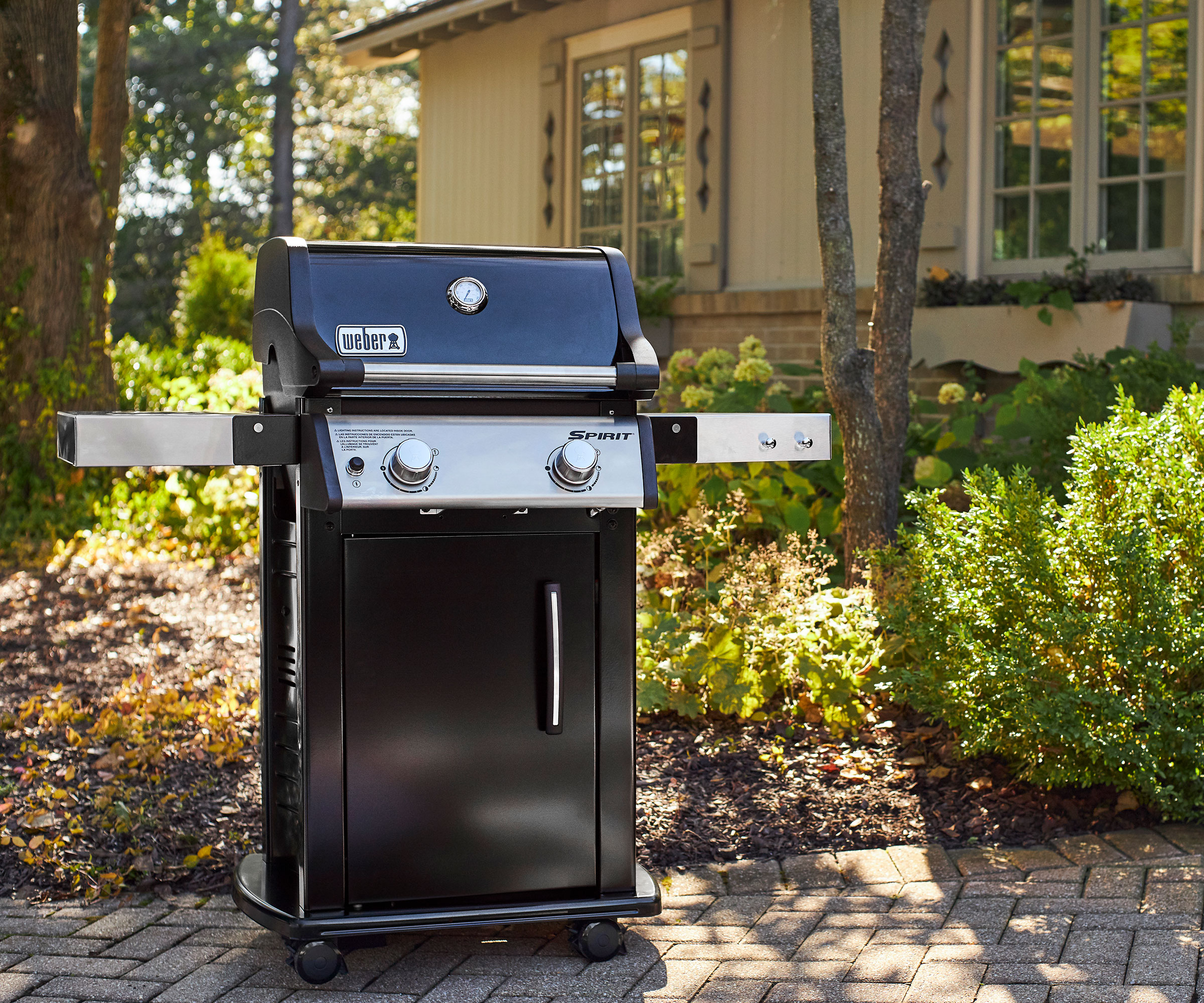
However, gas grills have several drawbacks. The single biggest drawback is taste. Grilling and appliance expert Millie Fender told me that 'gas grills still make delicious food, but they miss the smokiness of a charcoal grill. By comparison, even the best burgers from a gas grill taste a little sterile'.
Gas grills are also a lot more expensive than charcoal grills. Even basic gas grills are hundreds of dollars more expensive than a mid-range charcoal grill. If you want a big grill packed with features, you're looking at a $2000 outlay before you even buy your propane.
Millie told me that 'the final drawback is safety - or at least the feeling of safety'. She says that 'used properly, gas grills are perfectly safe, but if you're uncomfortable with propane, it can feel daunting no matter how many precautions you take'.

Millie Fender was Head of Reviews on the Homes and Gardens Ecommerce team. She specializes in cooking appliances like grills and has reviewed dozens in her career. She is now the Senior Home Editor at Tom's Guide.
Charcoal grills: Pros
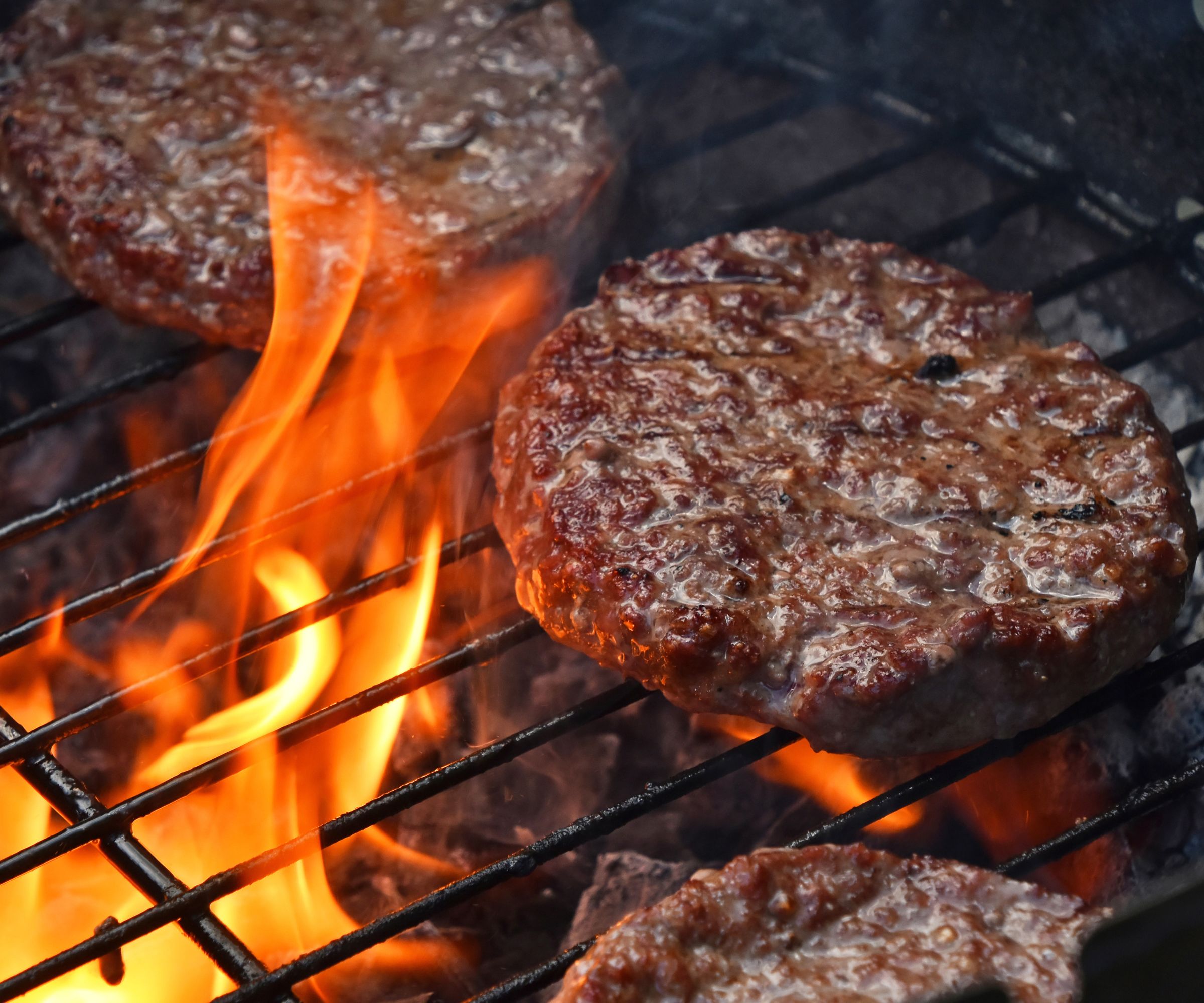
The best thing about charcoal grills is the taste. When you cook on charcoal, oils and fats from whatever you're cooking fall onto the coals underneath and vaporize. This creates a smoky flavor that gas grills cannot match. I've tasted better burgers from cheap charcoal grills like this $96 grill at Walmart than I have on expensive, top-line gas grills, simply because of this effect.
That brings us to the second benefit of a charcoal grill. They're a lot cheaper than gas grills. You can get a good charcoal grill for under $100. Even the fanciest models are rarely more than $400. The ongoing costs are relatively low too, as all you need is a bag of charcoal and some matches.
Charcoal grills are often better for specific dishes. If you like to grill steak, you need a charcoal grill, because it can reach a much higher temperature than a gas grill and give you a better sear.
Charcoal grills: Cons
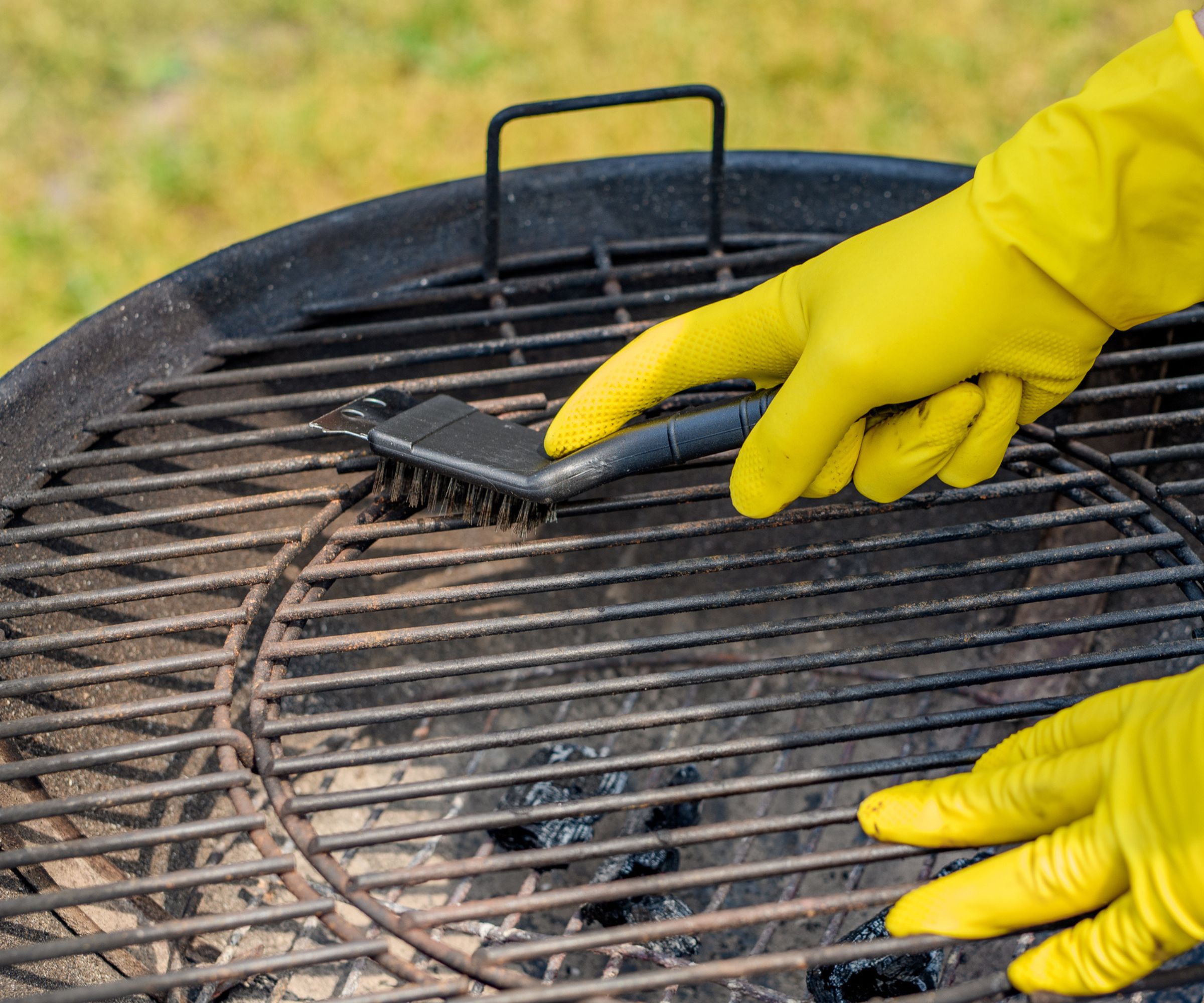
Charcoal grills might taste better, but all the smoke can be a nuisance. Grill smoke is an easy way to irritate a neighbor or incur the wrath of your HOA if you grill too near the house. If you leave your back door open as you grill, you might blow a load of grill smoke into your home and onto your clothes and soft furnishings. While it's a delicious smell while you cook, it's less tasty a couple of days later when your sofa still smells like burgers.
Charcoal grills lack the convenience of gas grills. You have to master lighting them, and it's easy to get this wrong. On top of that, charcoal grills take longer to reach temperature than gas grills. The most heat-efficient charcoal grill I've used, the Weber Kettle 22, available at Weber, reached temperature in about 20 minutes, whereas gas grills are ready in half the time. On a windy day or with a less efficient grill, it can take half an hour or even 40 minutes.
Charcoal grills are also harder to cook on because you can't easily control the temperature. With a little practice, you'll learn to use the center of the grill to sear and the edges to cook more delicate foods, but it's a steep learning curve. That's in part because they don't have the handy bonus features of a gas grill. Most charcoal grills don't have side burners, which can be a lifesaver for steaks or whipping up sides like crispy onions. You also have a shorter cooking window. With gas, you can theoretically cook until the propane runs out. With charcoal, you have a couple hours of grilling time and a much more limited amount of time for searing.
Finally, charcoal grills can be more difficult to clean. You have to wait a day for it to completely cool before you can clean it, which is inconvenient, and charcoal ash can easily stain clothes and furniture. While lump wood charcoal ash can be a great source of carbon for your compost, ash from briquettes with additives must be put in the trash. It's generally the case that this ash is fine to go in the general trash, but in some cases, rules about ash disposal can vary from state to state and county to county. It can amount to a lot of fuss after an afternoon's grilling.
Buy charcoal if:
- You want the best-tasting food
- Money is tight
- You want to sear a steak
Buy gas if:
- You want something easy
- You want bonus features
- You don't like smoke
- You want more control
Grill FAQs
Are charcoal grill ashes good for a garden?
Charcoal grill ashes can be good for your garden, but not always. You should only use ashes from lump wood charcoal. The ashes from most charcoal briquettes are full of chemical additive to help them ignite, and these can be harmful to your plants.
How do I know when my charcoal grill is ready?
It's easy to tell when a your charcoal grill is ready. When the charcoal is white hot, it's ready to go. If you can still see black patches, your grill isn't ready.
Sign up to the Homes & Gardens newsletter
Design expertise in your inbox – from inspiring decorating ideas and beautiful celebrity homes to practical gardening advice and shopping round-ups.

As a gardens and lifestyle contributor, Alex makes sure readers find the right information to help them make the best purchase. Alex got his start in reviewing at the iconic Good Housekeeping Institute, testing a wide range of household products and appliances. He then moved to BBC Gardeners’ World Magazine, assessing gardening tools, machinery, and wildlife products.
-
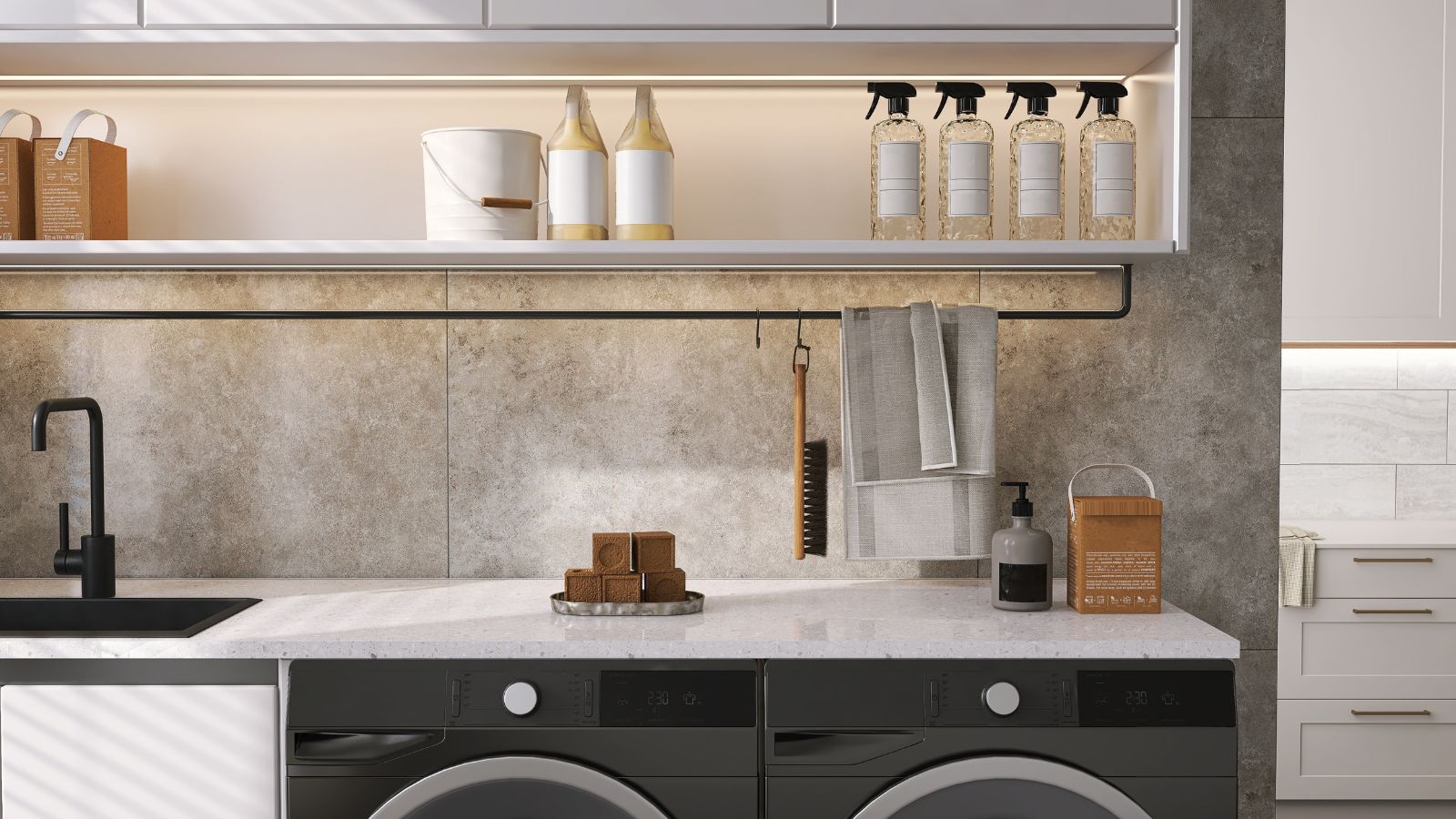 Extend the lifespan of your appliance with 5 simple but crucial washing machine maintenance tips
Extend the lifespan of your appliance with 5 simple but crucial washing machine maintenance tipsFrom cleaning the filters to keeping the door open, experts reveal the washer tips they swear by
By Andy van Terheyden Published
-
 These are the 6 must-have colors to decorate with in April 2025
These are the 6 must-have colors to decorate with in April 2025What do retro-inspired yellows and beautiful blues all have in common? They're on our hot list for the season ahead
By Sophia Pouget de St Victor Published